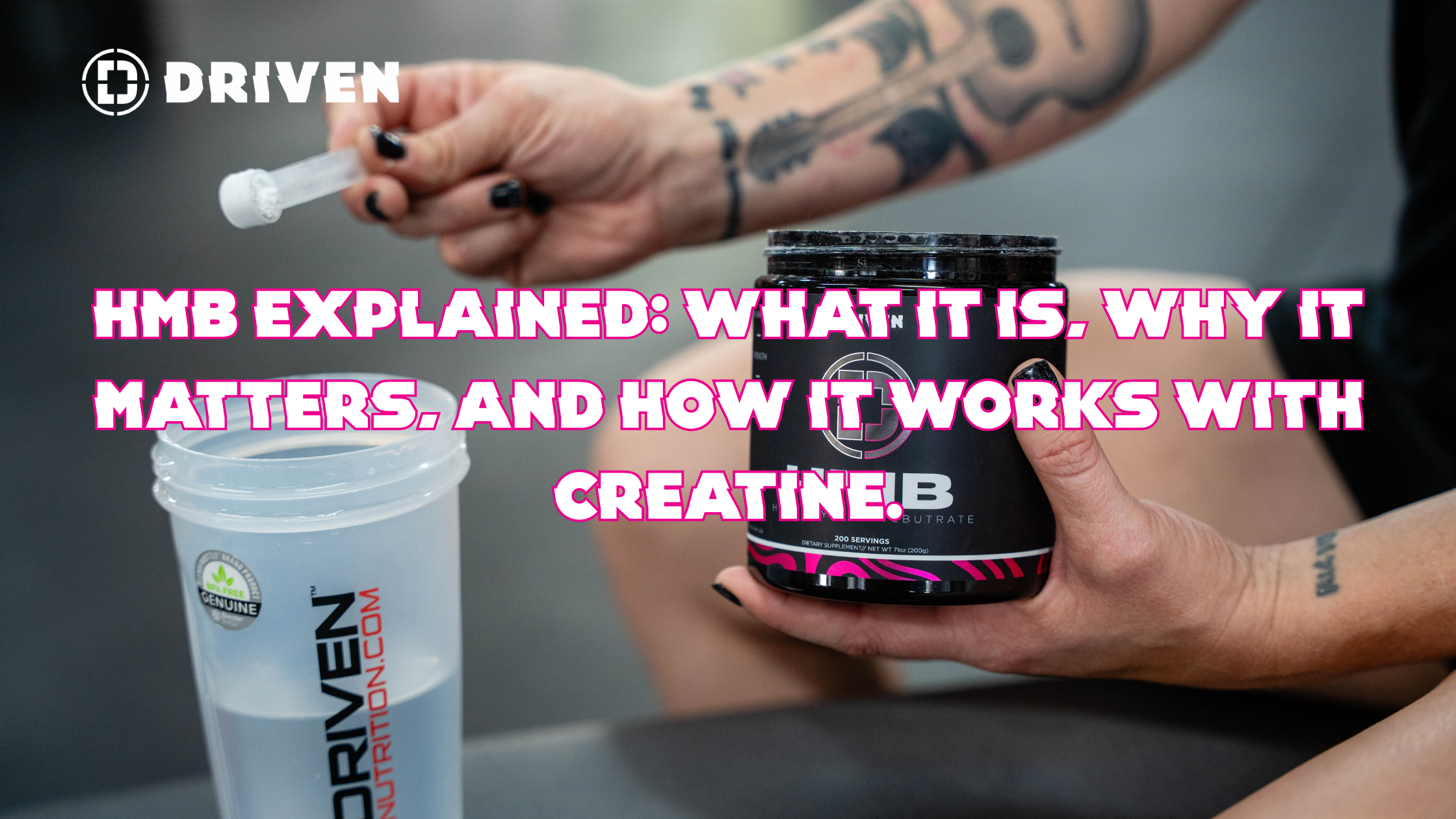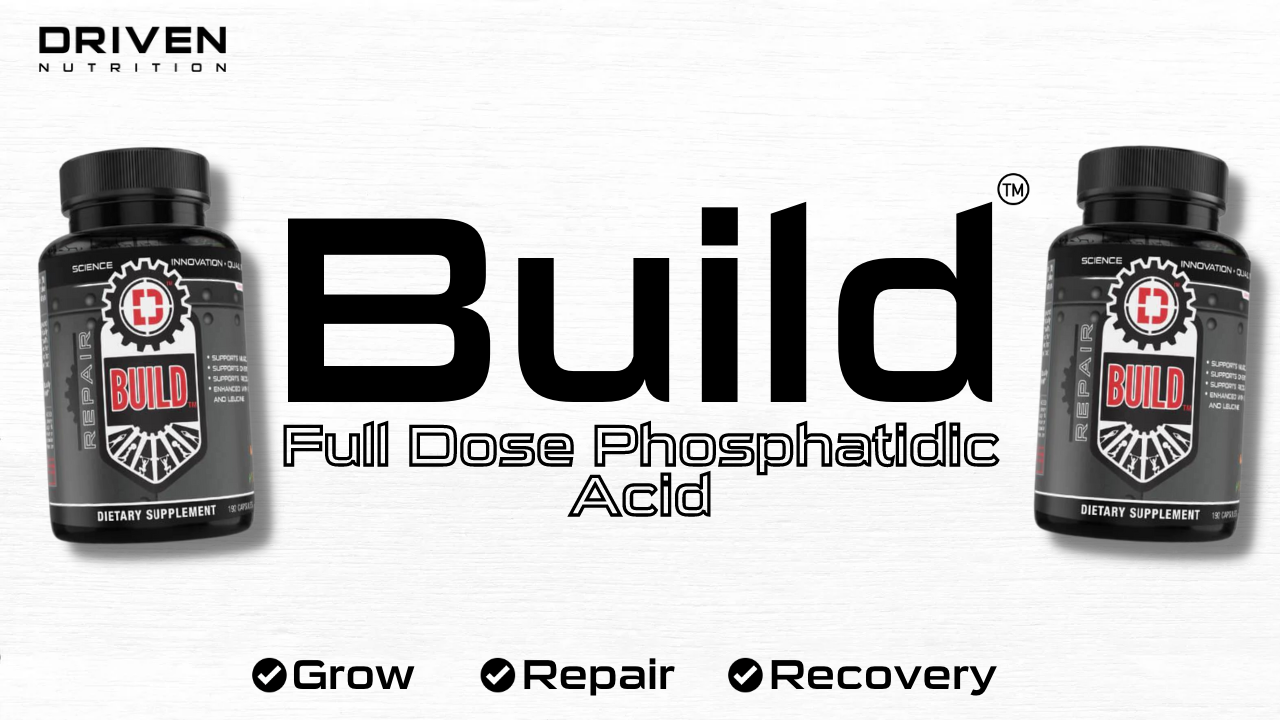
In the ever-growing world of sports nutrition, some supplements stand out more than others. Creatine is well-known. Protein powder is a staple. But there’s another compound making waves among athletes and fitness enthusiasts: HMB (β-hydroxy β-methylbutyrate).
While not as widely recognized as creatine, HMB has been studied for its unique ability to support recovery, reduce muscle breakdown, and even complement other supplements. In this post, we’ll break down exactly what HMB is, why people use it, how to add it to your daily regimen, and the exciting science on combining HMB with creatine.
What Is HMB?
HMB, short for β-hydroxy β-methylbutyrate, is a naturally occurring compound made when your body breaks down the amino acid leucine. Leucine itself is well known for its role in stimulating muscle protein synthesis, but only about 5% of leucine gets converted into HMB.
Because the body produces such a small amount, supplementing with HMB ensures levels are high enough to influence muscle health and recovery. Research shows HMB helps by:
-
Reducing muscle protein breakdown (anti-catabolic effect)
-
Supporting muscle protein synthesis (pro-anabolic effect)
-
Decreasing markers of muscle damage after intense training
-
Lowering inflammation and oxidative stress post-workout
In short: HMB acts like a shield, helping your muscles recover faster and protecting them from being broken down.
Why Use HMB?
So, what does that mean in practice? Here are some of the main reasons athletes and everyday lifters reach for HMB:
-
Faster Recovery
Studies show HMB can reduce soreness and improve recovery time after high-intensity training. This makes it especially valuable during demanding training cycles or competition prep. -
Preserving Lean Muscle
When calories are restricted (cutting phases) or when training is extremely taxing, HMB helps preserve muscle mass. It’s also been studied in older adults to slow down age-related muscle loss. -
Strength & Body Composition Support
Some research points to modest improvements in strength and lean mass when HMB is combined with resistance training — especially in people who are new to lifting or those under heavy physical stress.
While HMB won’t replace a solid nutrition and training plan, it may give you an extra edge in performance and recovery.
How to Add HMB Into Your Daily Regimen
Dosage
-
The most common dosage: 3 grams per day
-
Often split into 1 gram, 3x daily to maintain consistent levels
Timing
-
Total daily intake matters more than timing, but taking a dose 60–120 minutes before training may be beneficial.
Duration
-
Studies typically run from 4–12 weeks, with noticeable benefits appearing within that window.
-
It’s safe for longer-term use, but always evaluate your progress and goals.
Safety
-
HMB is generally well tolerated with few side effects.
-
Look for third-party tested supplements to ensure quality.
HMB + Creatine: A Powerful Combo
If you already take creatine, here’s where things get interesting: research suggests stacking HMB with creatine may provide synergistic benefits.
Why They Work Well Together
-
Creatine boosts short-term energy production by replenishing ATP, giving you more strength, power, and endurance in high-intensity efforts.
-
HMB reduces muscle breakdown and enhances recovery, helping you get back to training harder and sooner.
-
Together, they tackle both performance output (creatine) and muscle protection/recovery (HMB).
What the Research Says
-
Studies have shown that combining HMB and creatine can improve strength, aerobic capacity, and recovery markers more than either supplement alone.
-
Research in athletes found the combo supported lean muscle growth, testosterone balance, and reduced muscle damage during training blocks.
-
Not all studies show huge effects, but overall evidence leans toward this being a smart, science-backed stack.
How to Take Them Together
-
Creatine Monohydrate: 3–5 grams daily (standard dose)
-
HMB: 3 grams daily (split doses recommended)
-
They can be taken together in a shake, or at different times of day — consistency matters more than timing.
Final Thoughts
HMB may not have the same “household name” status as creatine or whey protein, but it’s a powerful tool worth considering. Whether you’re pushing through intense training, cutting weight, or simply looking to recover faster, HMB offers science-backed benefits — especially when paired with creatine.
Think of creatine as the performance enhancer and HMB as the muscle protector. Together, they create a well-rounded foundation for strength, endurance, and recovery.
As always, remember: supplements are just that — supplements. The foundation is still proper training, good nutrition, hydration, and recovery habits. But if you’re looking to level up your stack, HMB + creatine may be the combo you didn’t know you needed.
-
Wikipedia – β-Hydroxy β-methylbutyric acid (HMB)
Overview of what HMB is, forms, and research background
👉 Wikipedia: HMB -
PubMed Central – HMB in exercise and health
Review of how HMB affects protein metabolism and recovery
👉 PMC: HMB Mechanisms & Muscle Health -
Memorial Sloan Kettering Cancer Center – Integrative Medicine database
Safety, dosing, and clinical uses of HMB
👉 MSKCC: HMB Supplement Monograph -
Holland & Barrett – What is HMB?
Consumer-friendly overview of HMB, dosage, and uses
👉 Holland & Barrett: What is HMB? -
Systematic Review – Combination of Creatine Monohydrate + HMB
Effects on performance, composition, and hormone status
👉 PMC: Creatine + HMB Review -
Journal of the International Society of Sports Nutrition
The addition of HMB to creatine supplementation and performance
👉 JISSN: Creatine + HMB -
ResearchGate – 10-week creatine + HMB in elite rowers
Showed synergy in aerobic capacity
👉 ResearchGate: Creatine + HMB in Rowers -
MDPI – Biomolecules journal
Creatine + HMB and testosterone/cortisol ratio improvements
👉 MDPI Biomolecules: Creatine + HMB -
PricePlow Blog – Creatine + HMB synergy explained
Simplified breakdown of how the two work together
👉 PricePlow: Creatine + HMB Synergy -
Lippincott / NSCA Journal – Six-week study on HMB & training
Looked at strength and anaerobic capacity
👉 JSCR: HMB Study



